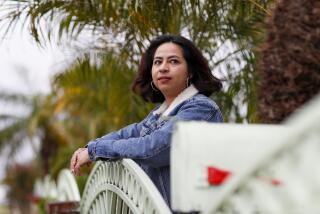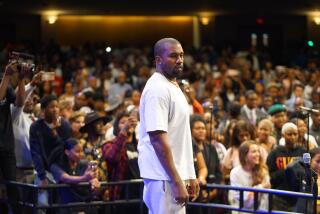Distant Spat Plays Out in L.A. Courts
- Share via
A nondescript stucco building on Slauson Avenue went into escrow earlier this year. One small sale in a real estate-obsessed town, it also signaled that Los Angeles had become the latest battleground in a bitter family feud that has divided one of Nigeria’s highest-profile faiths and sparked violent protests in Africa.
Six years ago, the two oldest children of Olumba Olumba Obu, the “Sole Spiritual Head of the Universe,” began fighting over which of them should succeed their father as head of the Brotherhood of the Cross and Star -- and gain control of the religion’s considerable finances. It wasn’t long before the dispute spread to Obu’s U.S.-based children.
In this country, the siblings have sued one another over who has the right to sell church property.
The latest round began in February, when some members of the brotherhood sold the Los Angeles bethel, a run-down white storefront with a red awning and a sign declaring OOO that looms over a block of auto shops and other small businesses.
Before the new owners could take possession, Ajah Obu, a daughter of the religion’s founder, objected to the sale. Also known as “the Supreme Mother of Peace, Love and Justice,” Ajah Obu said her brother Fred Obu and his allies sold the building “to get it away from me.”
She sued, accusing him and other church members of fraud and seeking to recover hundreds of thousands of dollars in proceeds from the sale of the building as well as punitive damages.
But other members of the brotherhood say it is Ajah Obu who is trying to defraud them. They say she had been disrupting services and had improperly taken out a $167,000 loan against the building before it was sold.
They also sued her, claiming that her father stripped her of her authority over the religion in the United States in 2003, instead putting her in charge of the Caribbean. The lawsuit seeks an injunction to prevent her from representing herself as an authority with the brotherhood in this country. It also seeks repayment of the $167,000 plus interest and attorneys’ fees.
In the turmoil, some worshippers stopped attending services on Slauson, said Chris Ogwonuwe, a Nigerian immigrant who converted to the brotherhood in Los Angeles. Now, a dwindling number -- around 20 -- gather at a new location in Gardena.
In papers in Los Angeles civil court, both sides have submitted official religious documents -- in some cases affixed with the thumbprint of their father -- to prove that they are the ones with the true authority. Both sides say they felt they had no choice but to resort to the legal system, even though their religion preaches against it.
“This is one of the things my father has preached: No one should take anyone to court,” Ajah Obu said in an interview in her lawyer’s office, her feet bare as prescribed by her religion. “The ministry is not going anywhere because of all this fighting.”
Olumba Olumba Obu officially founded the Brotherhood of the Cross and Star in 1956 in the southern Nigerian town of Calabar. Born in a farming village, Obu, known as OOO, became revered as a healer and miracle worker. His movement grew rapidly.
By 1980, the brotherhood was estimated to have 600,000 members. By the 1990s, religious scholars in Nigeria claimed it had more than 1 million adherents around the world. It now claims 10 million members, a figure that could not be independently verified. The Los Angeles area has fewer than 100.
The religion has had a relatively low profile in the U.S., although James Ellerbe, an Atlanta-based bishop, appeared in several newspapers during the trial of Michael Jackson when he and other members showed up outside the courthouse to support the pop star. Ellerbe said he “received spiritual information” that Jackson was not guilty.
Followers say the brotherhood is a spiritual movement in which members embody the attributes of Christ. Followers read the Bible, but they also follow Obu’s teachings and, in Nigeria, paint OOO on their houses and cars.
Rosalind Hackett, a professor of religion at the University of Tennessee who has studied the movement, said that followers come from all strata of Nigerian society and revere Obu to a degree that makes the religion somewhat controversial among traditional Christian churches.
“The literature and the adulation surrounding the leader is quite marked,” she said. She added that people would wait for hours just to see Obu, and that many believed he had almost supernatural powers.
Other scholars said the brotherhood is a prime example of the kind of syncretist religion that sprang up in Africa during the colonial period and is waning as young people flock to more traditional Pentecostal services.
Over the last half-century, the brotherhood has been an important institution, especially in Calabar, where it has helped orphans and the disabled, erected a school and trained followers in trades such as sewing and typing, Hackett said.
In recent years, Nigerian Pentecostal churches have begun to send missionaries around the world, a reversal of the trend a hundred years ago when missionaries poured into Africa from the U.S. and Europe.
The brotherhood, Hackett said, was one of the first Nigerian faiths to send missionaries overseas. Included in that wave to the U.S. were several of Obu’s children -- although they came primarily for education, not evangelism. Orlando Obu and Fred Obu went to New Jersey. Ajah Obu went first to Oakland and then came to Los Angeles. They pursued careers and started families, slipping into the American fabric like countless other immigrants.
But back in Calabar, tension was building over who would succeed OOO. Born in 1918, the founder was said to be blind and in recent years has rarely been seen outside his compound.
On one side of the dispute was Obu’s eldest son, also named Olumba Olumba Obu but referred to as Rowland, appointed in 2001 by his father as his successor. On the other was Obu’s eldest daughter, Ibum, who had garnered the loyalty of some of the movement’s bishops.
Ibum and some of the bishops believe that she should have been given some control, and violent clashes erupted in Calabar, according to Nigerian newspapers.
Eventually, Ibum withdrew with some bishops to the town of Uyo but kept control of some church finances.
Ellerbe said Ibum had “stripped the church’s treasury” of “millions” over the last few years. He said he could not quantify how much.
The dispute continues to split the brotherhood -- although Ellerbe claims that many followers who left with Ibum have now repented and rejoined.
Ellerbe, an American-born son of sharecroppers who now holds the position of international field minister for the church, said the dispute was “a misunderstanding on Mother Ajah’s part” to believe she had the authority to run the kingdom as a family affair. “They’re looking at it as ‘My Daddy,’ while everyone else is looking at it as ‘Our Father,’ ” Ellerbe said.
“The kingdom is about oneness, love for one another,” he added. “Within the family, for that divine system to be broken, it saddens me.”
Larry Fabrizi, Ajah Obu’s lawyer, said his client would like to settle the dispute out of court, as she “feels it goes against the teachings of her father.”
More to Read
Sign up for Essential California
The most important California stories and recommendations in your inbox every morning.
You may occasionally receive promotional content from the Los Angeles Times.













